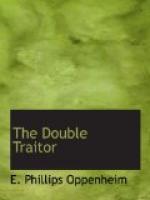“I scarcely see of what value these things would be to a vendor of crockery.”
“They would be of no value at all,” Selingman admitted. “It is not in the crockery business that I propose to make use of you. I believe that we both know that. We may dismiss it from our minds. It is only fencing with words. I will take you a little further. You have heard, by chance, of the Anglo-German Peace Society?”
“The name sounds familiar,” Norgate confessed. “I can’t say that I know anything about it.”
“It was I who inaugurated that body,” Selingman announced. “It is I who direct its interests.”
“Congratulate you, I’m sure. You must find it uphill work sometimes.”
“It is uphill work all the time,” the German agreed. “Our great object is, as you can guess from the title, to promote good-feeling between the two countries, to heal up all possible breaches, to soothe and dispel that pitiful jealousy, of which, alas! too much exists. It is not easy, Mr. Norgate. It is not easy, my young friend. I meet with many disappointments. Yet it is a great and worthy undertaking.”
“It sounds all right,” Norgate observed. “Where do I come in?”
“I will explain. To carry out the aims of our society, there is much information which we are continually needing. People in Germany are often misled by the Press here. Facts and opinions are presented to them often from an unpalatable point of view. Furthermore, there is a section of the Press which, so far from being on our side, seems deliberately to try to stir up ill-feeling between the two countries. We want to get behind the Press. For that purpose we need to know the truth about many matters; and as the truth is a somewhat rare commodity, we are willing to pay for it. Now we come face to face. It will be your business, if you accept my offer, to collect such facts as may be useful to us.”
“I see,” Norgate remarked dubiously, “or rather I don’t see at all. Give me an example of the sort of facts you require.”
Mr. Selingman leaned a little forward in his chair. He was warming to his subject.
“By all means. There is the Irish question, then.”
“The Irish question,” Norgate repeated. “But of what interest can that be to you in Germany?”
“Listen,” Selingman continued. “Just as you in London have great newspapers which seem to devote themselves to stirring up bitter feeling between our two countries, so we, alas! in Germany, have newspapers and journals which seem to devote all their energies to the same object. Now in this Irish question the action of your Government has been very much misrepresented in that section of our Press and much condemned. I should like to get at the truth from an authoritative source. I should like to get it in such a form that I can present it fairly and honestly to the public of Germany.”
“That sounds reasonable enough,” Norgate admitted. “There are several pamphlets—”




